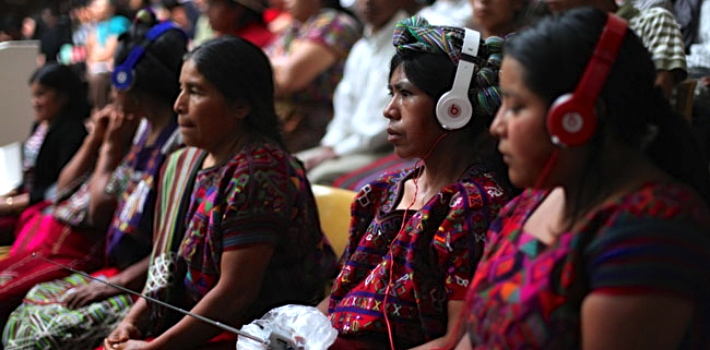
Español In May 2013, former Guatemalan head of state Efraín Ríos Montt and Director of Military Intelligence (G-2) Mauricio Rodríguez Sánchez were tried and convicted of genocide and crimes against humanity — only for the Constitutional Court to squash the sentence on insubstantial technicalities 10 days later.
A second round took place last week on January 5, and drama was in abundant supply. Ríos Montt’s defense tried to excuse the former general from being present at the trial, arguing a weak medical condition. When he was summoned by the authorities, he arrived an hour late and on a stretcher, sporting the look of a terminally ill patient and wearing dark goggles reminiscent of Peter Sellers’s character in Stanley Kubrick’s Dr. Strangelove.
The courtroom also had to resolve a challenge presented by the defense of bias on the part of presiding Judge Irma Valdéz, who wrote a thesis on the topic of genocide. She did not admit it, arguing that hers was an academic opinion, not a legal one. The tribunal allowed it, however, and the trial has been postponed until another judge can be selected to preside — a timeframe in the order of months.
It is dumbfounding that her objectivity was challenged on the basis of an academic work. In the polarized debate that surrounds the trial and figure of Ríos Montt, an attempt at systematic understanding should be laudable. More often than not, bias confirmation and emotional responses trump all possibilities for reconciliation.
The Thin Line: Was It Genocide?
Genocide is a very specific crime. It involves an action committed “with intent to destroy, in whole or in part, a national, [ethnic], racial or religious group,” according to the UN Genocide Convention from 1948. In Guatemala, the trial must resolve whether the mass killings of the 1980s were a systematic attempt to eliminate a particular group, the indigenous population of the Ixil Triangle, a locality formed by the intersection of three villages in the Guatemalan highlands.
Carlos Sabino, an historian and regular contributor with the PanAmPost, has said that Plan Victoria, the main policy that the army followed under Ríos Montt’s command, did not contain such intent. But a crucial component of Plan Victoria was Plan Sofía, which had the purpose of eliminating subversive elements in Quiché, where the higher concentrations of killings took place. The army believed, rightly, that the indigenous population in the Ixil Triangle favored the guerrilla, and they sought to eliminate them.
Plan Victoria was an improvement over the simple scorched-earth policy pursued by the previous head of state, Romeo Lucas García. By providing weapons and food staples (“beans and rifles”) to civil self-defense patrols controlled by the state, the army gained support among the population and effectively secured the eventual defeat of the guerrilla. It also paved the way to the end of the conflict, but at an immense cost.
When comparing indigenous and non-indigenous deaths, Patrick Ball and his team found that the likelihood of indigenous people in the Ixil Triangle being killed by the army was eight times that of the non-indigenous population. Ball directs the Human Rights Data Analysis Group and was a key witness in the 2013 trial. He also concluded that the risk was higher under Ríos Montt’s administration than any other period.
This evidence suggests that genocide was indeed pursued under Ríos Montt, but only when a clear resolution is reached by the courts will justice be achieved for the victims and a precedent be set.
The Amnesty Question
Even if the trial resumes, the first point of disagreement is the application of amnesty. In 1996, the National Reconciliation Law called for the amnesty of all political crimes, though it explicitly excluded genocide, torture, and other crimes against humanity.
Another amnesty, passed in 1986 by Ríos Montt’s successor Oscar Humberto Mejía Víctores, was designed to guarantee immunity from prosecution for all crimes committed under both administrations. The 2013 judges did not allow its application, but when the Constitutional Court reversed that trial, they also requested that the appeals court substantiate the decision not to allow it.
Amid the uncertainty, considerable pressure is in the pipeline to promote the idea that what took place in Guatemala was not a genocide. The right to due process is necessary if the goal is to bring about justice and not just a political vendetta, some say. However, it is just as necessary to admit that due process — in a society ruled by exploitative institutions — is not guaranteed for everyone equally. Only elites, Ríos Montt included, have access to such privilege.
Marta Elena Casaus Arzú, a sociologist and expert witness at the 2013 trial, asserts that tactics from private organizations to block justice are another example of institutional racism. The powerful elites, who have historically tapped on indigenous forced labor, seem worried that if the Ixiles gain rightful justice, they will have a precedent to make other historical demands, such as the age-old call for land reform.
Justice was once again denied to the victims of state-organized violence of the 1980s. In the name of due process technicalities and a non-existent rule of law, the possibility of unearthing the ghosts of the past and walking in the right direction has been postponed.
Luis Eduardo Barrueto is a Guatemalan journalist who resides in London, United Kingdom, and is completing a masters in media and globalization. Follow @lebarrueto.
Edited by Fergus Hodgson.
 Versión Español
Versión Español












